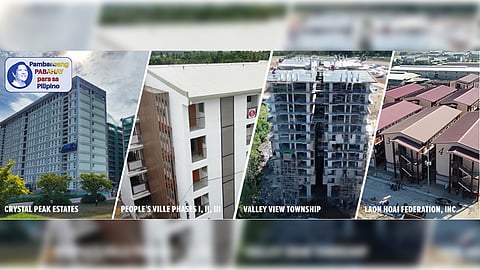
- NEWS
- the EDIT
- COMMENTARY
- BUSINESS
- LIFE
- SHOW
- ACTION
- GLOBAL GOALS
- SNAPS
- DYARYO TIRADA
- MORE

Since its inception, the Pambansang Pabahay Para sa Pilipino Housing (4PH) Program has made significant strides toward addressing the Philippines’ housing backlog, which aims to put up an estimated 6.5 million homes.
Launched by the Department of Human Settlements and Urban Development (DHSUD), in May 2024, under the leadership of Secretary Jose Rizalino Acuzar, the 4PH Program aims to provide affordable, resilient and sustainable housing for low-income and underserved Filipino families.
The initiative has become the government’s flagship housing program, representing a comprehensive effort to transform the country’s housing sector.
The primary goal of the 4PH Program is to build one million housing units annually over six years, targeting a total of six million homes by 2028.
This ambitious plan seeks not only to provide physical shelter but to create inclusive and sustainable communities that are integrated with essential services and infrastructure.
The program focuses on multi-sector collaboration, involving national government agencies, local government units (LGUs) and private sector partners.
One of the major achievements of the 4PH Program has been its successful mobilization of public-private partnerships (PPPs).
The DHSUD has entered into agreements with numerous real estate developers, financial institutions and private companies to pool resources and expertise.
These partnerships have been key in accelerating the pace of housing production while ensuring that the homes are affordable and accessible to the target beneficiaries.
Private developers have also played a crucial role in financing and building the housing units, while government agencies, such as the National Housing Authority (NHA) and Social Housing Finance Corporation (SHFC), have provided financial mechanisms, including subsidies and low-interest loans, to make homeownership more attainable for Filipinos.
LGUs have been tasked with identifying suitable land for development and facilitating the necessary permits and approvals to fast-track housing projects.
Many LGUs have signed Memoranda of Understanding (MOUs) with DHSUD, committing to support the construction of 4PH housing developments in their jurisdictions. This decentralized approach ensures that the housing needs of each region are met according to local conditions and demands.
Since its launch, the 4PH Program has completed several housing projects across the country, with many more currently under construction, some of which are in Western Visayas, Bicol, Davao Region and Cordillera Administrative.
These developments feature resilient, disaster-resistant housing units designed to withstand the natural hazards that frequently affect the Philippines, such as typhoons, earthquakes, and floods.
In line with sustainable development goals, the program also incorporates green building principles, promoting energy efficiency, waste reduction, and the use of sustainable materials.
Moreover, the 4PH Program has integrated livelihood opportunities into its housing developments.
By fostering partnerships with vocational institutions and industry stakeholders, the program offers skills training and job placements to residents, helping them improve their economic prospects.
This focus on community-building ensures that beneficiaries do not just receive houses but also access to the resources and opportunities needed for long-term stability.
Despite its successes, the 4PH Program faces challenges, particularly in terms of funding and land availability. The DHSUD is working with Congress to secure additional budgetary support, while also exploring innovative financing solutions, such as bond issuances and joint ventures with foreign investors.
The 4PH Program is an effort to address the housing needs of millions of Filipinos, with its multi-sectoral approach and focus on resilience, sustainability, and community development.
